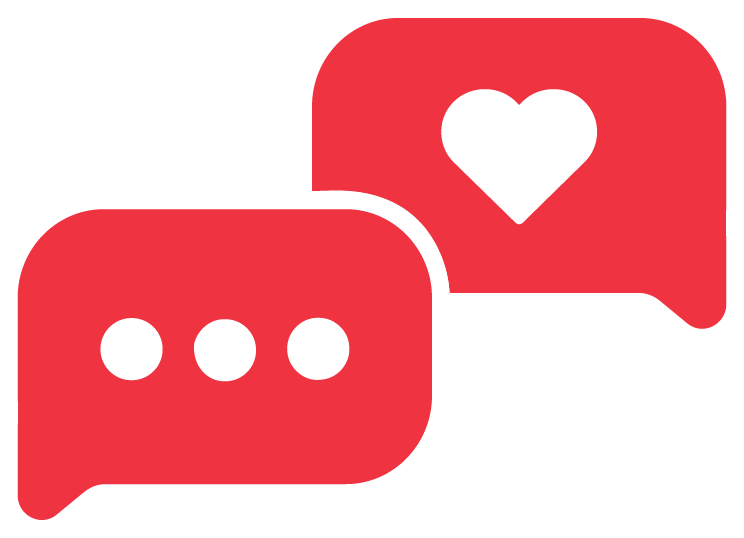Creating Awareness About Youth Mental Health Challenges in Honor of World Mental Health Day
Registrations are now closed, check out our event recap below.
“We all deserve to be open—and compassionate—about our struggles. When we do, we become better advocates for ourselves and others.” – Dior Vargas, Queer Latina feminist mental health activist.
The COVID-19 pandemic highlighted and exacerbated the global mental health crisis, fueling short- and long-term stresses and undermining the mental health of millions, especially our youth. In the US, our youth are currently experiencing an unprecedented and escalating mental health crisis. This is why, in honor of World Mental Health Day, Crisis Text Line hosted a social media event series featuring topical discussions about youth mental health to bring awareness to this critical issue.
We believe there is hope in empathy. World Mental Health Day provides our community an opportunity to reduce stigma and help everyone access the support they need. Stand with us to create a movement for an empathetic world where nobody feels alone.
“Mental health challenges in children, adolescents, and young adults are real and widespread. Even before the pandemic, an alarming number of young people struggled with feelings of helplessness, depression, and thoughts of suicide — and rates have increased over the past decade. The future wellbeing of our country depends on how we support and invest in the next generation.” –US Surgeon General Vivek Murthy.
At Crisis Text Line, we dedicated a full week in honor of World Mental Health Day on October 11-13, 2022.
Crisis Text Line’s Social Media Event Series
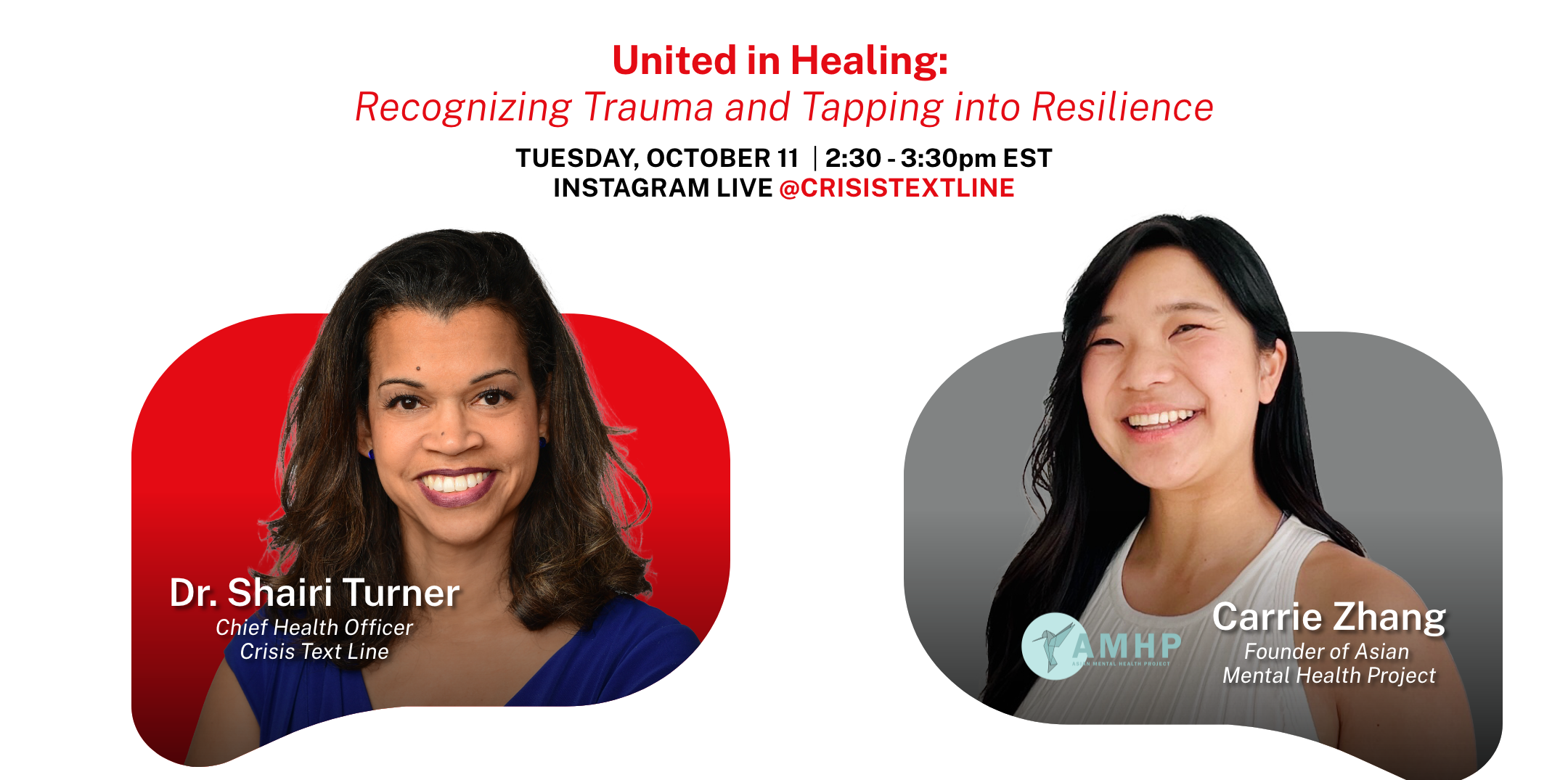
United in Healing: Recognizing Trauma + Tapping into Resilience
Instagram LIVE Event hosted on October 11, 2022 at 2:30pm EST
Special Guests: Carrie Zhang, Founder of the Asian Mental Health Project and Crisis Text Line’s Chief Health Officer, Dr. Shairi Turner
Event Recap
That’s a wrap on our United in Healing event! Whether you were live with us or not, we’ve got you covered. Listed below are the top takeaways and if you would like to watch the full IG Live event, you can do so here. Let’s dive right in.
During the the IG Live, Dr. Shairi Turner and Carrie Zhang discussed what trauma meant to them and how it shows up in people’s lives. They dove into the nuance of what resilience mean to them and shared valuable coping tools and strategies with the community.
Find Your Coping Tool
In order to take care of your mental health, it is important to find coping tools that will work for you. Finding a coping tool may take time and patience — as the process is very individualized. In the IG Live, Carrie shares a tip with our viewers, “What would a younger you like to do?”
Coping Tool #1: How to talk to your friends & family about your mental health needs
Starting a conversation about mental health can be difficult, but we’ve compiled some guides to best prepare you for those conversations. Click the links below for a full guide:
Teen Guide
College Guide
Coping Tool #2: Connect with your senses 5-4-3-2-1
In times of stress and anxiety, sometimes getting ourselves grounded is the best starting point. The 5-4-3-2-1 Grounding strategy is one to remember. Focus on your senses (what you can see, hear, feel, smell, etc) will help you stay grounded in the present moment. Use the video below to walk you through the exercise.
Note: It’s okay if you don’t have access to all five senses. Feel free to use whatever senses work best for you to find a cool calm.
Coping Tool #3: Make a Mental Health Crisis Plan
Your mental health is important and at one point or another, you (or someone you know) may need some tools to cope with difficult emotions as they arise. The best way to prepare yourself is to have a plan before you need it. Create your crisis plan here.
Coping Tool #4: Community Care
Find connection and resources that are there for you, whether it means digitally or in-person. Carrie emphasizes that surrounding yourself with like-minded individuals can help build resilience.
Community care is a huge part of Asian Mental Health Project’s mission. “Stay in, Check in” is a series of free wellness group offerings for community healing. Learn more and sign up here.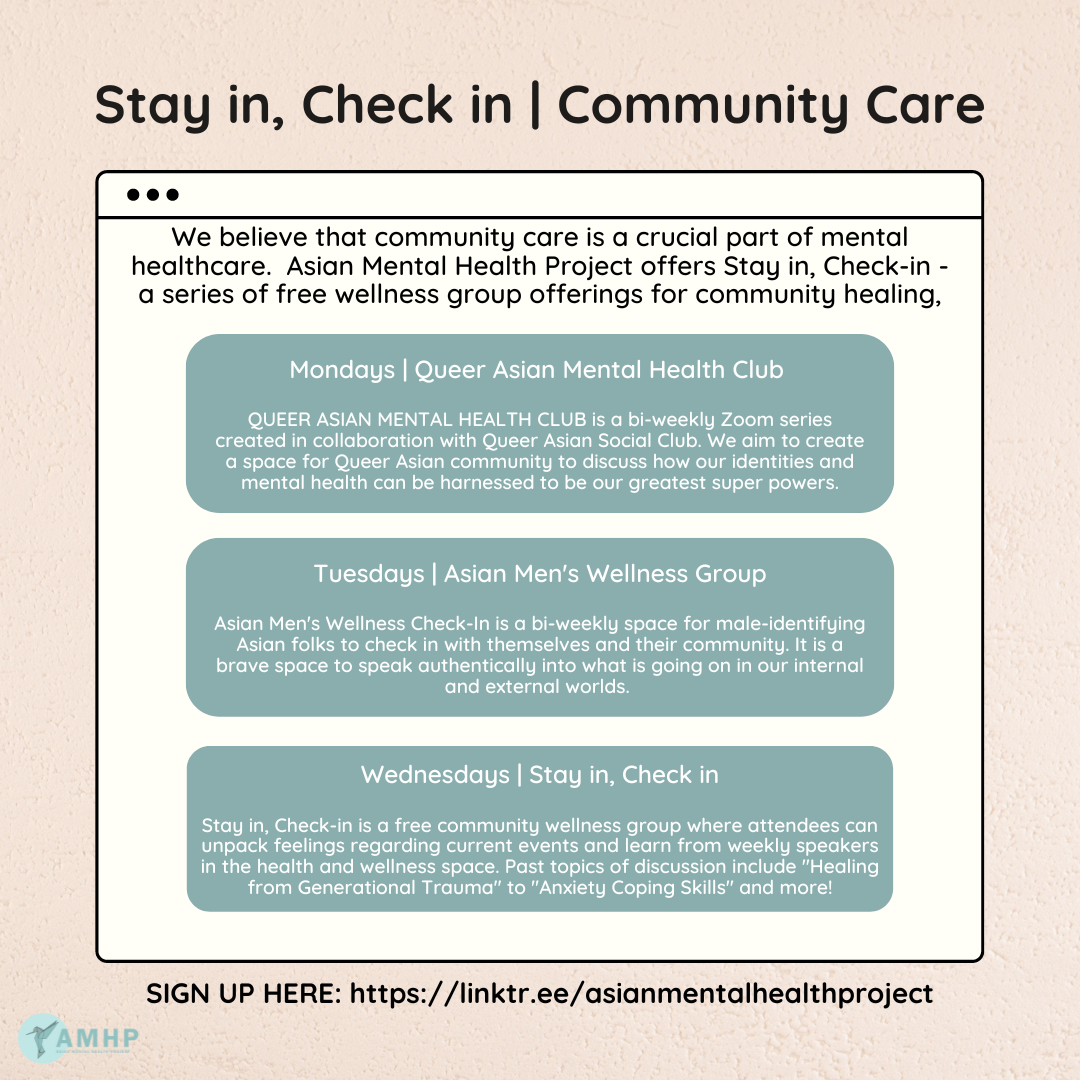
Other Common Coping Tools
In our 2021 United in Empathy report, we learned that the coping tools and mechanisms below increased in popularity last year:
- Streaming music.
- Watching TikTok, documentaries and anime.
- Turning into gaming by either watching their favorite streamers on Twitch or playing Roblox and Minecraft.
- Indulging in self-care habits like getting a massage, eating their favorite foods, and going to the gym.
- Taking part in spiritual rituals like burning incense and crystals.
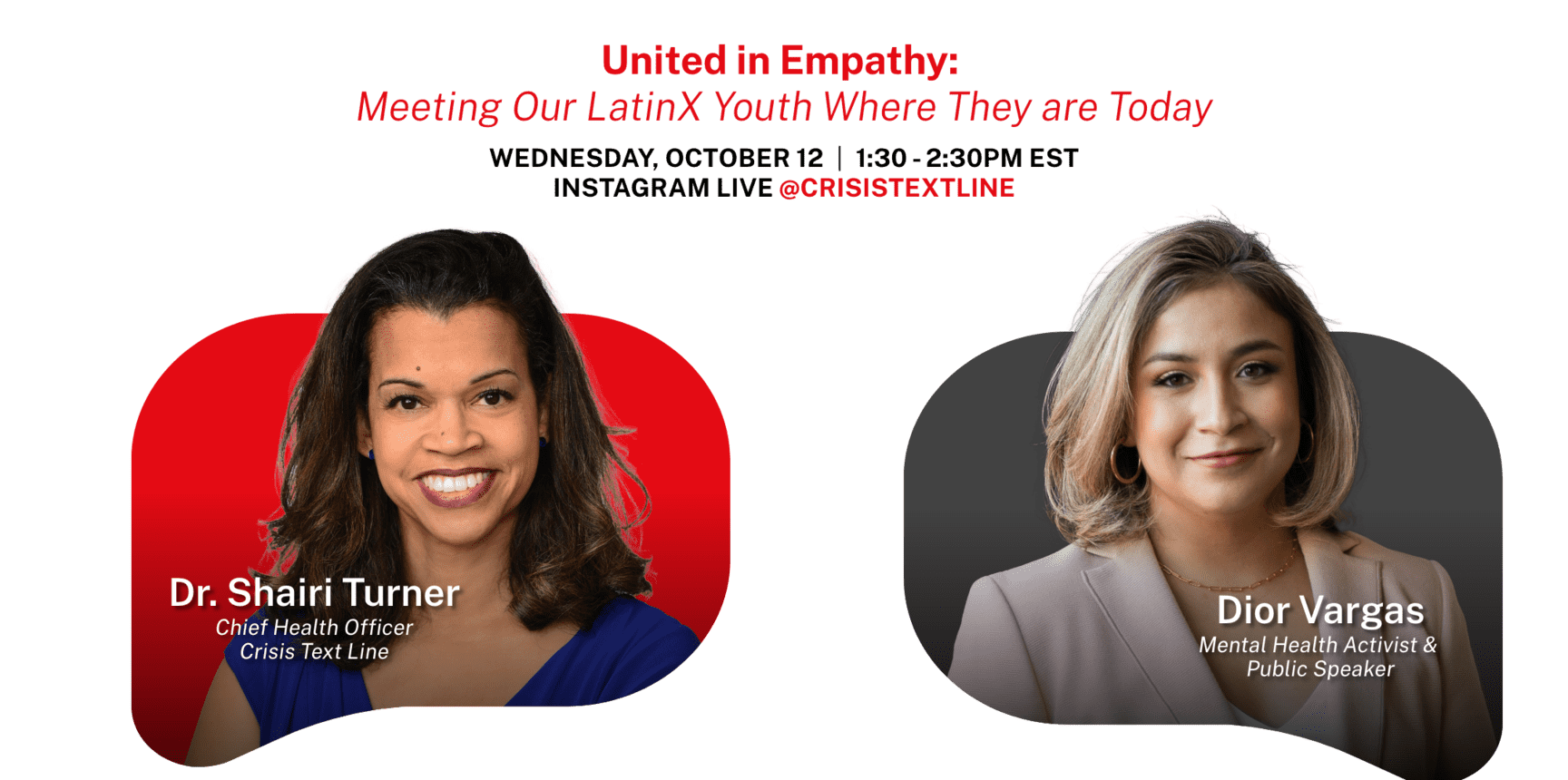
United in Empathy: Meeting Our LatinX Youth Where They are Today
LIVE Instagram Event hosted on October 12, 2022 at 1:30pm EST
Special Guests: Dior Vargas, Mental health activist and public speaker, and Crisis Text Line’s Chief Health Officer, Dr. Shairi Turner
Event Recap
If you missed our IG Live with Dior Vargas today, don’t fret! We’ve compiled key takeaways for you and if you would like to view the full session, you can do so here.
Key Statistics and Data for our Youth
At Crisis Text Line, our texters are overwhelmingly young and diverse. Over 70% are under 24 years old (14% Black, 19% LatinX, 7% Asian, 4% Native American/Alaska Native). Based on our data, year over year, our texters consistently reach out about depression, relationships, anxiety, suicide, isolation and self harm.
Over the last several years, we’ve embarked on an ongoing commitment to centering equity in our service. We’ve done so by:
- Offering training on cultural competence to our volunteers
- Collaborating with community organizations to increase access to our service and
- Launching our service in Spanish
Did you know that LatinX/Hispanic youth are more likely than their white peers to have mental health issues? More than half of LatinX young people (18 -25) have a serious mental illness that is not treated and only 5.5% of mental health providers are able to offer their service in Spanish.
Dior Vargas
Dior Vargas is a leading intersectional mental health activist delivering education and resources to all communities, with an emphasis on the QTBIPOC community. She is known for her incredibly powerful “People of Color and Mental Illness Photo Project” that was developed to break stigmas in communities of color. She is also an author, speaker and regular contributor to top tier news outlets like New York times, Forbes and Newsweek.
More recently, she was invited to the White House for the 32nd anniversary of the American with Disabilities Act, to meet with Vice President Kamala Harris, and other disability advocates to discuss the impact of the Dobbs decision on the disability community.
Coping Tools
Coping Tools #1: Check in with your friends and family
At Crisis Text Line, we “always ask” to see how a texter is doing to get a better picture of how they are feeling. Below are samples of prompts and conversation starters:
- “I care about you. You’ve mentioned that you’ve been struggling lately. Is there anything I can do to support your mental health?”
- “You matter to me. I notice you’ve been acting differently lately. How is your mental health?”
- You can also find more prompts here
If you are a teen or young adult wanting to seek support from friends or family, we’ve created a conversation guide. Check out the links below:
Teen Guide
- English
- Spanish
College Guide
- English
- Spanish
Want to keep it light and casual? You can also use our GIPHY stickers on social as a means to encourage your friends.
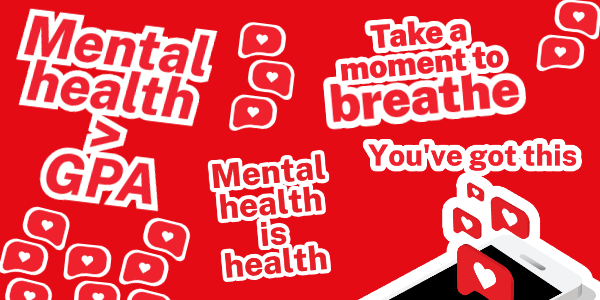
Coping Tool #2: Make a crisis plan
As we discussed in our first IG Live, making a Crisis plan before you need can help immensely. Need help creating a Crisis plan? View our guide in English.
Coping Tool #3: Breathing techniques
If you are in a moment of crisis, it’s crucial to make sure you can find your breath. Taking a few moments to focus on your breathing when you’re in stressed and anxious, can work wonders. Use this video as a guide to your breathing, and pass it on to a friend who could use it too.
You can find the Spanish version of the breathing video here.
What is your favorite coping tool? Let us know on Instagram! Be sure to tag us with #UnitedInEmpathy — we’d love to hear from you.
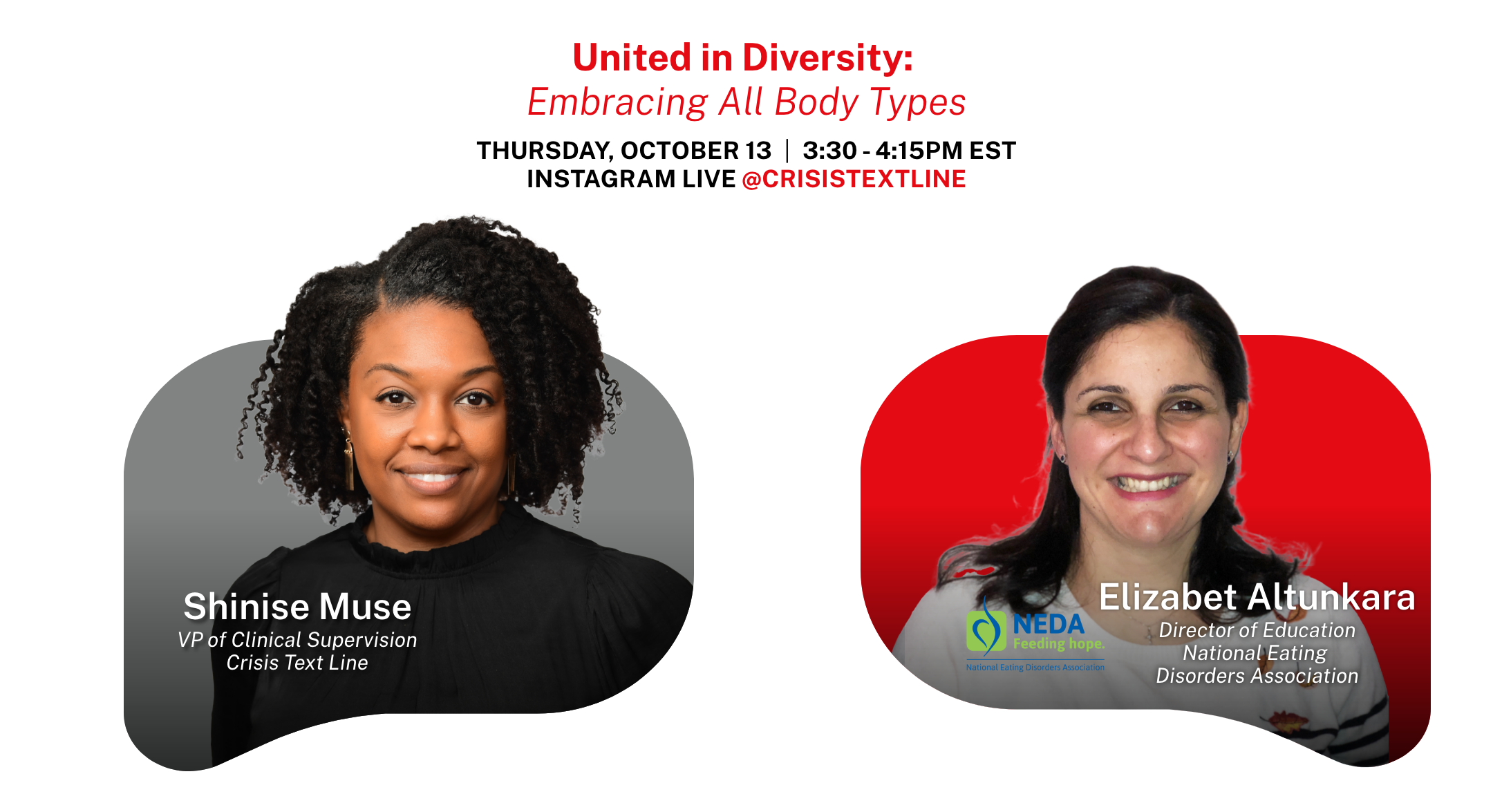
United in Diversity: Embracing All Body Types
LIVE Instagram Event hosted on October 13, 2022 at 3:30pm EST
Special Guests: Elizabet Altunkara, Director of Education at National Eating Disorders Association (NEDA) and Shinise Muse, Crisis Text Line’s Vice President of Clinical Supervision
Event Recap
… in a blink of an eye, World Mental Health Week is over! We hope you found our IG Live sessions compelling and helpful. We’d love to hear how it the event went for you. If you have 2 minutes, we encourage you to take a quick survey.
Missed our Live Instagram event about embracing body types? You can watch the full event here and if you don’t have the time to watch all of it. We’ve round up the top event highlights below — let’s dive right in!
Let’s learn more about NEDA
Did you know that the National Eating Disorders Association (NEDA) is the largest nonprofit organization dedicated to supporting individuals and families affected by eating disorders? Their mission is to support individuals and families affected by eating disorders and they work to prevent, cure, and make quality care more accessible to everyone.
A couple of programs that we discussed were:
For Body Acceptance Week, the social media campaign involves promoting body acceptance for all by highlighting nuances of body positivity, body neutrality and body liberation.
- Body positivity encourages unconditional love, no matter what a body looks like.
- Body neutrality views the body through a neutral lens – one without judgement or forced positivity.
- Body liberation promotes inclusivity, body autonomy, fat acceptance, and size diversity. The idea is to separate a person’s self-worth from their body or appearance.
Join us and take the pledge to show your commitment to body acceptance for yourself and others!
Coping Tools Shared
Coping Tool #1: Back to school guide for eating disorders
For students, educators and parents seeking resources about eating disorders, NEDA recommends checking out their 2022 Back to School Guide. Elizabet also pointed out that NEDA’s screening tool is helpful to take a look at if you are unsure about seeking professional help.
Coping Tool #2: Consider journaling
If you are feeling overwhelmed, one way to find a cool calm is by taking a few minutes to pause and reflect. Journaling can be a helpful tool to help you find some grounding and peace if you feel like you’re spiraling. Watch the video below for a few prompts to get started!
Coping Tool #3: Make a mental health crisis plan
If you’ve attended all three sessions, you’ve probably noticed that making a mental health crisis plan is a coping technique featured in all events and there’s a great reason why! The best way to prepare yourself is to have a plan before you need it. If you haven’t already done so, make your crisis plan now.
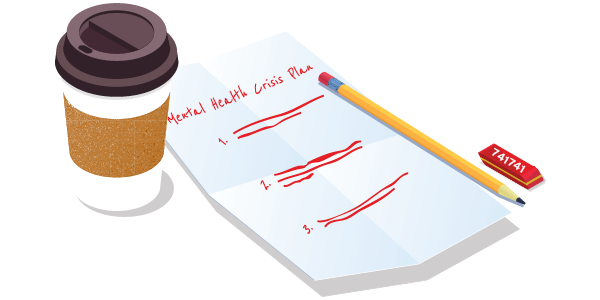
What is your favorite coping tool? Let us know on Instagram! Be sure to tag us with #UnitedInEmpathy — we’d love to hear from you.
What’s next?
Save us on your phone.
Simply scan or screenshot the QR code below.
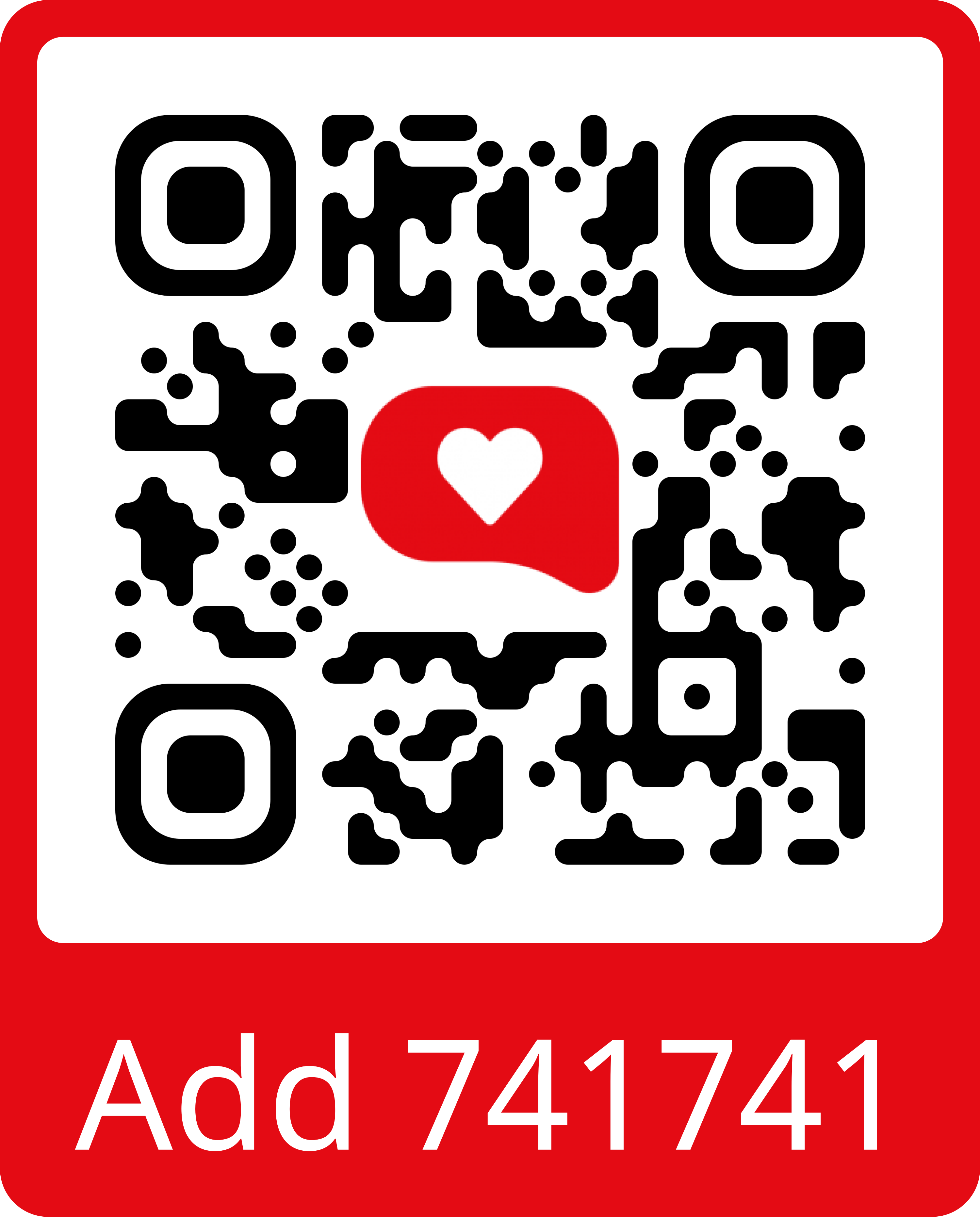
Crisis Text Line
Since our launch in August of 2013, Crisis Text Line has trained over 55,000 volunteers and engaged in 7.5 million crisis conversations. In a world where opening up about mental health struggles can be difficult, Crisis Text Line enables people of all ages to courageously share about things like anxiety, depression, self-harm and suicidal ideation. Young people know they can count on us—an empathetic space to support them to lighten the load and tap into their resilience.
“Imagine what it would be like if all young people had access to mental health care. Together we are making that vision a reality.” – Carrie Zhang, founder of the Asian Mental Health Project.
Let’s stand together to create awareness about the importance of youth mental health and help us spread empathy in your community by sharing 741741.
#UnitedinEmpathy for Youth Mental Health

